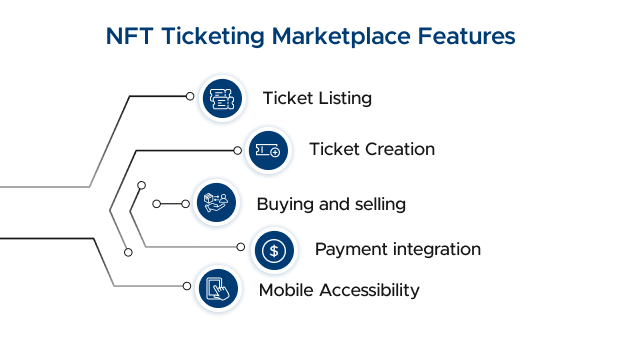-
In recent years, non-fungible tokens (NFTs) have transformed various industries in the digital world. One area where NFT development is making a significant impact is ticketing. The emergence of an NFT ticketing marketplace is revolutionizing the way we buy, sell, and experience events.
In this article, we will explore the concept of NFT ticketing marketplaces, their benefits, and their features.
NFT Ticketing System
In NFT ticketing systems, NFTs represent event tickets. Blockchain securely stores these NFTs and ensures authenticity. These NFTs include event details and act as one-of-a-kind identifiers.
Users can buy, sell, or trade these NFT tickets through digital marketplaces. NFT ticketing facilitates the process, minimizing intermediaries and enabling attendees to handle tickets virtually. This system enables ticket issuers to receive a payment on every resale.
Check It Out | How NFT Ticketing Disrupts The Ticketing Industry
NFT Ticketing Marketplace
NFT ticketing marketplaces are platforms where tickets are transformed into NFTs and made available for purchase. These platforms offer unique digital tickets that you cannot replicate.
Additionally, when ticket holders resell their tickets in secondary markets, the original event manager or artist receives royalties. It is even possible for event managers to set maximum prices for secondary sales, ensuring that fans do not overspend on tickets.
Since the NFT boom, NFT ticketing platforms have already achieved success and people expect them to continue thriving in the Web3 world. Some of the popular platforms in this space include GUTS, YellowHearts, Seatlab, and NFT TiX.
You May Also Like | NFT Marketplace Development for the Digital Age
Benefits of NFT Ticketing Marketplace
NFT ticketing marketplace offers several benefits compared to traditional ticketing systems. Here are some key advantages:
Transparency and Security
Developers created NFTs on blockchain technology, which provides a transparent and immutable record of ticket ownership and transactions. It enhances security, reduces the risk of counterfeit tickets, and creates a trustless environment for buyers and sellers.
Enhanced Fan Engagement
NFT ticketing platforms can offer interactive and immersive experiences. These experiences may include augmented reality (AR) or virtual reality (VR) content, exclusive merchandise, meet-and-greets, or other perks associated with the ticket. It enhances fan engagement and creates additional value beyond attending the event.
Also, Explore | AR and VR for NFT Development
Revenue Generation
NFT ticketing marketplaces can provide new revenue streams for event organizers and artists. They can earn a percentage of secondary market transactions or offer limited edition NFT tickets with premium features at higher prices. It creates scarcity and exclusivity.
Ownership and Transferability
NFT tickets grant ownership rights to holders. They can easily transfer or resell this ownership through the marketplace, enabling a secondary market for tickets. It allows fans to buy, sell, or trade tickets securely and efficiently.
Suggested Read | Blockchain-Powered Digital Ticketing Platform Development
Authenticity and Fraud Prevention
NFTs are unique and verifiable digital assets, ensuring the authenticity of tickets. It helps eliminate ticket fraud and scalping issues commonly encountered with traditional paper or digital tickets.
Reduced Ticket Distribution Costs
NFT ticketing eliminates the need for physical printing, shipping, and handling of tickets. Consequently, it reduces distribution costs for event organizers. Also, it eliminates the risk of lost or stolen tickets.
Data Insights
NFT ticketing platforms enable the collection of valuable data on ticket sales, customer preferences, and behavior. This data can help event organizers make informed decisions, improve marketing strategies, and enhance the overall event experience.
Reduced Ticket Counterfeiting
NFTs' unique digital properties make it extremely difficult to counterfeit or replicate tickets. This aspect lowers the risk of fraud and ensures that genuine tickets are being sold.
Global Accessibility
NFT ticketing eliminates geographical barriers and allows fans globally to purchase event tickets. It expands the potential audience and increases ticket sales.
Also, Visit | Exploring Blockchain-Based Digital Ticketing Management
NFT Ticketing Marketplace Features
An NFT ticketing marketplace typically includes a range of features to facilitate the buying, selling, and management of NFT tickets. Here are some of its key features:

Ticket Listings
Developers should list NFT tickets on your ticketing marketplace. It makes them visible and accessible to potential buyers. Listings should include relevant information about the event, ticket availability, pricing, and any special features associated with the ticket.
Ticket Creation
A marketplace should allow event organizers or ticket issuers to create NFT tickets associated with specific events. It includes defining ticket details such as event name, date, venue, seat location, and any additional information relevant to the ticket.
Buying and Selling
This marketplace should facilitate the buying and selling of NFT tickets between users. Buyers can browse available tickets, make purchases, and initiate transactions securely. Sellers can list their tickets for sale, set prices, and manage their inventory.
Payment Integration
Your marketplace should support secure payment options for purchasing NFT tickets. It may include integration with cryptocurrency wallets to facilitate crypto or other accepted forms of payment.
Mobile Accessibility
NFT ticketing marketplaces may offer mobile applications or mobile-optimized web interfaces to enhance accessibility and convenience for users. It allows users to easily browse, purchase, and manage their tickets from their smartphones or tablets.
Also, Check | The Curious Case of Blockchain in Event Management
Looking for NFT Ticketing Marketplace Development
NFT ticketing marketplaces have emerged as a game-changer in the ticketing industry. They leverage blockchain technology and NFTs to provide secure, transparent, and innovative solutions. If you are interested in developing a similar NFT ticketing marketplace, then you can connect with our blockchain developers today.

Our Offices
INDIA
Emaar Digital Greens, Sector 61,
Gurugram, Haryana
122011.
Welldone Tech Park,
Sector 48, Sohna road,
Gurugram, Haryana
122018.















